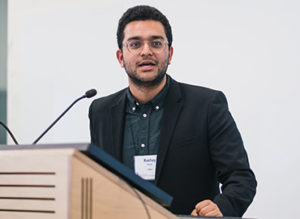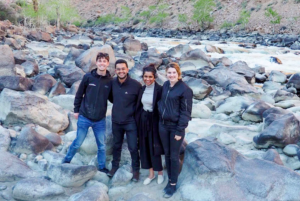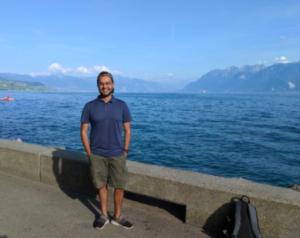‘Even Electricity is Political’
From performing research on Indonesian punk rockers to examining the way Geneva’s infrastructure affects peace institutions, Rushay Naik has been around the world and back during his time at UofT. Graduating with a degree in Peace, Conflict and Justice and Global Health, Rushay has researched case studies across the globe examining the relationship between health systems, infrastructure, and peace processes. He plans to further his studies as he pursues his Masters of Science in Global Health Services Research at the Dalla Lana School of Public Health. During this summer, Rushay has stayed busy working as a Summer Research Fellow for the University of Oxford COVID-19 Government Response Tracker.

Rushay Naik presenting his research on the future of urban infrastructure as a School of Cities Fellow
What initially drew you to PCJ?
Coming into UofT, I was interested in global health, so I was initially drawn to Human Biology. But I also wanted to study health as a political concept. My family, stemming from Apartheid-era Zimbabwe and Zambia, gave me an acute awareness of how politics affects health systems. In first year, I was in Munk One,which gave me the opportunity to understand how to approach solutions to global problems that would have an established impact. Through Munk One, I discovered PCJ. I realized it was not a traditional International Relations program and explored a number of topics. It took a much more holistic and interdisciplinary approach of global affairs that interrogated and questioned international crises. The small class sizes also appealed to me versus the big first year Con Hall classes I had been a part of. Plus, the Munk School has so many resources for students to research and challenge the world around them.

Rushay (second to left) alongside the research team in Mongolia studying a government initiative on solar home systems
What is your favourite aspect of PCJ?
Throughout my time as a PCJ student, I was able to be part of a number of projects that expanded my perspective. These experiences gave me an unparalleled opportunity to engage with what I was learning come to life. As a researcher in the Reach Project, my team researched solar home systems in Mongolia. Our research showed that a lack of energy built into an organized movement with political agency. It really showed me how even basic necessities are political. As a fellow for the Schools of Cities, I continued analyzing case studies where simple things contributed to peace. For example, in India, a bus transformed to a a hygiene facility, helped to build the community. In Texas, a vacant Walmart transformed into a library, helped bring about social stability. Getting out of the classroom was the best way to understand what I was learning in the classroom. I saw this especially in 4th year, where we were able to use research methods to analyze specific topics. We were taught why fairness was important and how all the tangential experiences we had throughout our time in PCJ could be applied to current realities. I was able to examine how relationships build capacity and agency and the multi-faceted impacts of such relationships.But above all, my favourite part of PCJ is the community. Over the span of 3 years, you get to know your classmates really well. You are surrounded by passionate individuals, all with different perspectives. It really gave me a sense of home.
What does your position entail day-to-day?

Rushay pictured in Geneva where he performed research on how the city’s infrastructure impacted the city’s function as a centre of global peace
I’m currently working on a global project based at the University of Oxford where we are working to build a dataset to be used by policymakers, journalists and scholars to understand the policy effects of COVID. We are collecting global data on government responses and coding updated in real time. This dataset is meant to build an early analysis of COVID-19 and its impact on state affairs in countries. We produce regional biweekly reports to summarize what has been happening around the world, with my focus being in South Asia. Our work also focuses on finding proactive solutions, especially in post-conflict settings. I’m also interested in how public health systems can prevent greater emergence of conflict by studying the partnerships between states and societies.
What influence did PCJ have on your path both at U of T and after?
Coming out of 4th year, I had gained a lot of information about the kinds of work I enjoyed. The dialogue that took place in our PCJ courses was always running in the back of my mind. I began to see concepts we discussed in class like state legitimacy and public trust in a real context. PCJ made me want to question who operates the mechanisms that affect peace processes. It all fed into the Master’s I am pursuing now where I am studying health systems and their service deliveries. I see these systems as potential solutions to improve state legitimacy, especially in fragile states where these institutions and data concerning them are rare.
What is one piece of advice you have to offer to either current or prospective students?
Use your experiences. Don’t be afraid to be personal. It only provides a richer conversation for everyone involved. And if you are passionate about something, find spaces where you will be part of the dialogue about such issues.